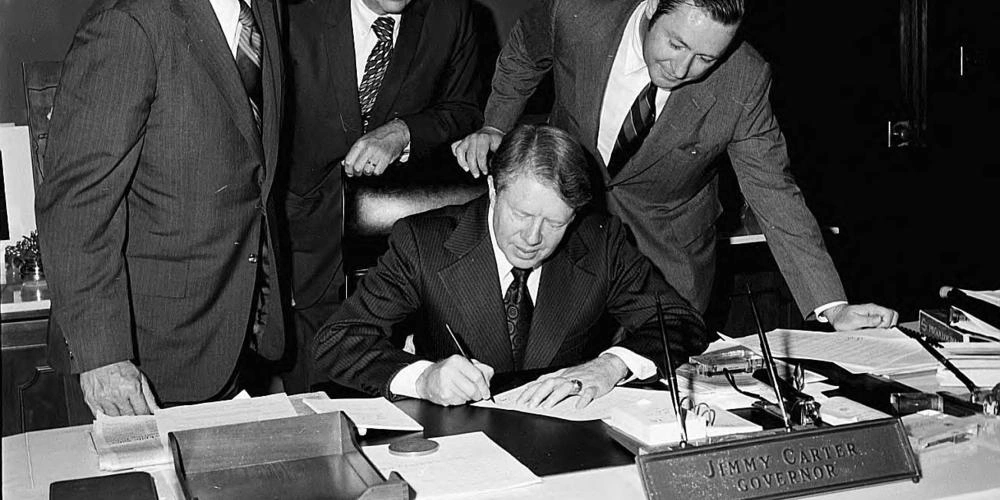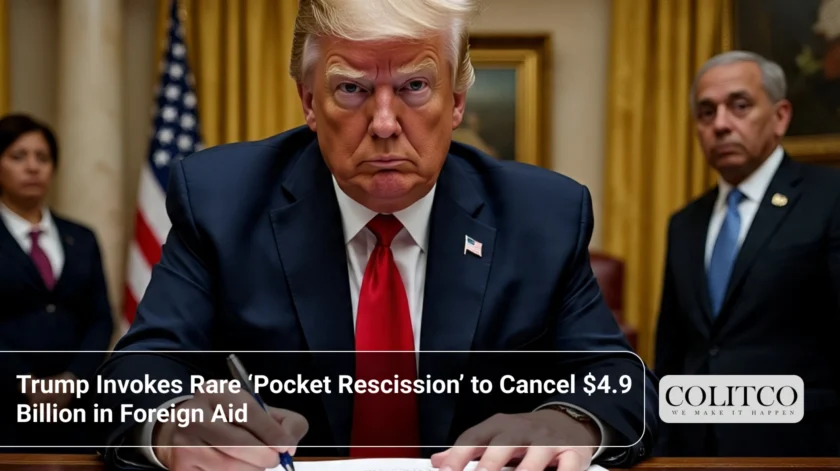President Donald Trump notified Congress that he would be cancelling foreign aid of $4.9 billion by utilizing the unusual budget tool known as a pocket rescission, last employed in 1977. The action has stirred legal and political debate in Washington.
Trump’s Revocation of Foreign Aid 2025
The letter written by Trump to the House Speaker, Mike Johnson, indicated that he planned to cut off the 2025 foreign aid grant to 15 international programs. The relocation is aimed at the State Department and USAID initiatives such as development aid, UN peace operations, and democracy support.
The White House Office of Management and Budget posted the letter on its authenticated X account, the first time in nearly a half-century the Trump provision under the Impoundment Control Act is being invoked through a pocket rescission. By submitting the rescission 45 days after the close of the fiscal year, the administration disenfranchises Congress from acting in a timely fashion, letting the funds lapse.
🚨 Last night, President Trump CANCELLED $4.9 billion in America Last foreign aid using a pocket rescission.@POTUS will always put AMERICA FIRST! pic.twitter.com/1DvXYGdy3B
— Office of Management and Budget (@WHOMB) August 29, 2025
The Legal Battle Over the Impoundment Control Act of Trump
The administration says it’s squarely within its legal authority, invoking its interpretation of the Impoundment Control Act and Trump’s power. Budget Director Russell Vought, a long-time supporter of expanding presidential budget authority, defended the action as being lawful.
Democrats and Republicans are still fighting back, however, arguing that the maneuver violates congressional power of the purse. Senate Appropriations Committee Chairwoman Susan Collins said in a press release that the pocket rescission of foreign aid that Trump tries to implement is illegal. She cited a Government Accountability Office opinion that called such moves illegal.
Congressional and Party Reactions
The response among lawmakers has been swift. Representative Rosa DeLauro, the senior Democrat on the House Appropriations Committee, called the action a flagrant disregard for the law and put guardrails at risk in future budget talks. Senate Democratic Leader Chuck Schumer called the action an attempt to bypass bipartisan budgeting processes and accused Republicans of supporting unilateral spending bills.
Republican lawmakers have generally kept quiet, though Collins publicly criticized the move. Most party members have supported Trump’s broader attempts at reducing foreign aid, even where this runs counter to the power of Congress.
White House Position and Funding Deadline
A senior White House official told reporters that the administration prefers a clean continuing resolution to continue funding the government after September 30. The aide warned that Democrats would bear the blame for a shutdown if they were unable to pass such a resolution.
The rescission notice places the targeted money in abeyance for 45 days. If during this period Congress does not pass laws putting through the cuts, the money would typically resume. But since the fiscal year extends through September 30, the timing means that the money will expire unused without congressional action.
Programs Affected by the Cuts
 UN operations are among the programs affected by Trump’s pocket rescission foreign aid decision
UN operations are among the programs affected by Trump’s pocket rescission foreign aid decision
The letter indicated that $3.2 billion would be cut from USAID development programs. Another $393 million would be cut from State Department peacekeeping accounts, $322 million from the Democracy Fund, and more than $444 million from other foreign assistance accounts.
The United Nations confirmed that peacekeeping monies would be affected. Spokesman Stephane Dujarric told the press the rescission would stress liquidity and force agencies to seek clarification from U.S. officials regarding the frozen funds.
Historical Context of Pocket Rescission, Foreign Aid Trump
 The last use of a pocket rescission foreign aid cut occurred under President Jimmy Carter in 1977
The last use of a pocket rescission foreign aid cut occurred under President Jimmy Carter in 1977
The earlier pocket rescission was utilized by President Jimmy Carter in 1977. Presidents since that time have typically sought congressional approval for rescissions. Congress approved $9 billion in reductions earlier this year after Trump officially requested rescissions, including public broadcasting and foreign aid reductions.
This new attempt, however, sidesteps congressional approval. Democrats warn that making this routine could undercut legislative control over where money is spent and shift power to the White House.
Market Outlook
Washington budget showdowns create uncertainty for markets most sensitive to government spending decisions. Even though possible financial effects are confined to recipients of foreign aid, investors monitor government appropriations negotiations to gauge fiscal stability. A looming deadline of September 30 creates the possibility of a government shutdown if no accord is reached.
Analysts point out that disputes over pocket rescission of foreign aid, Trump’s moves can exert pressure on broader fiscal negotiations. Currency and bond markets are likely to react to the risk of funding delays or shutdowns, especially when attached to issues of U.S. financial management.
FAQs
- What does Trump’s decision to cancel foreign aid 2025 involve?
It involves withholding $4.9 billion in foreign aid programs using a pocket rescission, preventing Congress from acting before funds expire. - What is a pocket rescission foreign aid Trump action?
It is when the president submits a rescission request near the fiscal year’s end, ensuring Congress cannot act in time and funds lapse. - When was the last time a pocket rescission was used?
The last use of a pocket rescission occurred in 1977 under President Jimmy Carter. - How much funding is being withheld under cancel foreign aid 2025?
The administration is withholding $4.9 billion across multiple State Department and USAID programs. - Which programs are affected by Trump’s rescission?
Funding cuts affect USAID development assistance, State Department peacekeeping, the Democracy Fund, and other foreign aid accounts. - What does the Impoundment Control Act Trump provision allow?
The Act allows the president to propose rescinding funds, but Congress must approve. Using it near fiscal year-end can leave funds unspent. - What portion of funds comes from USAID?
Approximately $3.2 billion comes from USAID’s development assistance programs. - How much is cut from State Department peacekeeping?
Around $393 million is targeted from State Department peacekeeping activities. - How much is being removed from the Democracy Fund?
The rescission would cancel $322 million from the State Department’s Democracy Fund. - How are UN programs affected by the cuts?
UN peacekeeping programs face reduced funding, which officials say will challenge liquidity and operations. - What have Democrats said about the pocket rescission foreign aid Trump action?
Democrats have said it violates the law and threatens Congress’s constitutional spending authority. - What did Representative Rosa DeLauro say about the rescission?
She said the action was “illegal” and vowed to seek stronger guardrails in upcoming budget negotiations. - How did Senator Susan Collins respond?
Collins, chair of the Senate Appropriations Committee, said the move was unlawful and undermines bipartisan budget processes. - What was Senate Minority Leader Chuck Schumer’s reaction?
Schumer said the plan showed Republicans were abandoning bipartisanship and risked pushing the government toward a shutdown. - What is the White House’s legal argument?
The administration argues it is on “firm legal ground” under its interpretation of the Impoundment Control Act Trump provision. - How long can Trump withhold the funds?
Funds are paused for 45 days under a rescission, but timing near the September 30 fiscal year-end means they lapse automatically. - How does this differ from earlier rescission attempts?
Earlier this year, Trump sought congressional approval for $9 billion in rescissions, which lawmakers approved. This time, he bypassed Congress. - What are the potential consequences for government funding?
The rescission may complicate negotiations to pass a continuing resolution before the September 30 deadline and could raise shutdown risks. - Why are markets monitoring cancel foreign aid 2025?
Markets watch budget disputes closely, as uncertainty about federal spending can affect bond yields, currency values, and investor confidence. - What is the broader significance of pocket rescission foreign aid Trump actions?
If used frequently, such actions could shift budgetary power from Congress to the executive, challenging long-standing constitutional spending authority.












